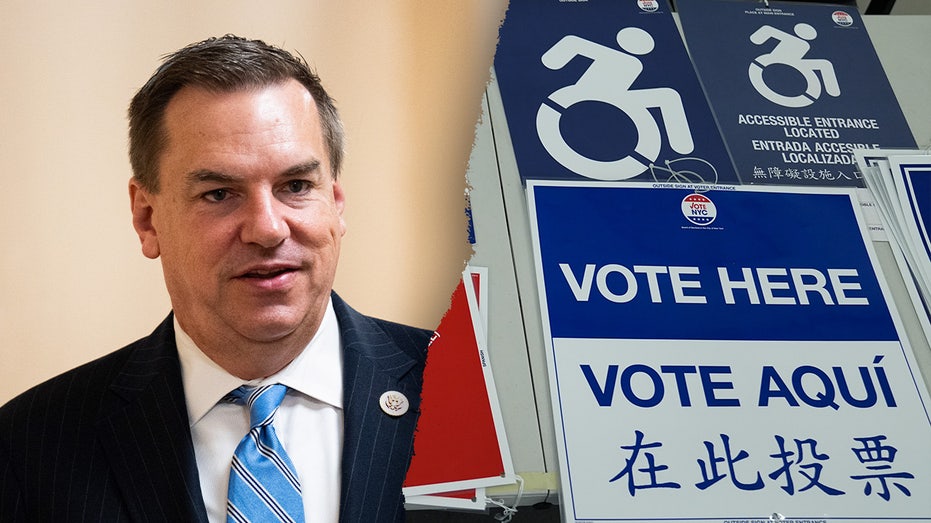An emergency bill to avert a government shutdown wasn’t all it’s quacked up to be.
The title of the measure bore one of the more lumpish, incongruous names for a piece of legislation designed to fund the government. Congress named the bill “To Amend the Permanent Electronic Duck Stamp Act of 2013 To Allow the Secretary of the Interior To Issue Electronic Stamps Under Such Act, And for Other Purposes.”
Legislation about ducks to fund the government?
That’s just daffy.
The duck bill which Congress converted into a spending measure wasn’t just a decoy. However, it is yet another stopgap bill, re-upping all old funding from the fiscal year which ended in September and extending things until early March.
HOUSE VOTES TO AVOID GOVERNMENT SHUTDOWN AFTER SPEAKER JOHNSON BUCKS GOP REBELS
Many House Republicans gave this bill the bird. They don’t like that this is the third temporary plan to avert a shutdown. That’s why only 107 House Republicans voted yes on the plan; 106 voted nay. There were 126 and 127 GOP yeas on the two previous spending plans. But those numbers plummeted last week.
This bill was certainly an ugly duckling.
House Democrats covered for Republicans, providing the majority of votes to approve the latest bill. That’s what Democrats did in earlier spending packages.
“The American people are frustrated that this does nothing Republican Congress can’t get out of its own way,” said House Minority Leader Hakeem Jeffries, D-N.Y.
Conservatives crowed about the latest extension hatched by House Speaker Mike Johnson, R-La.
SENATE PASSES SHORT-TERM SPENDING BILL TO FUND GOVT UNTIL MARCH, SAYS THERE WILL BE NO SHUTDOWN
“We just need a little more time on the calendar to do it,” said Johnson.
Johnson allies concede there’s a reason the speaker needs an assist from the Democrats. Republicans are operating the House on a wing and a prayer.
“It is the smallest Republican majority ever,” said Rep. Stephanie Bice, R-Okla. “I don’t care who you put in the speaker’s office. You’re actually going to have a very difficult time trying to govern.”
Democrats are in the minority. But it’s Republicans who often find themselves on a wild goose chase trying to round up votes for major bills. So to fund the government, a coalition of Democrats and Republicans teamed up. But conservatives? Those birds of a feather flocked together in opposition.
“We know that they are a dysfunctional majority. We know that they do not have actual votes to govern,” said House Democratic Caucus Chairman Pete Aguilar, D-Calif.
Johnson hopes the House’s individual spending bills to fund the government can soon take flight. The goal is to flush all 12 appropriations measures by early March.
Still, conservatives shot down Johnson’s decision to do another emergency spending bill. The 1980s comedy “Howard the Duck” scored better reviews from movie critics. If Johnson doesn’t fix this fast, it may be time for him to duck and cover.
But why would lawmakers use the waterfowl legislation bill to temporarily fund the government? There’s no reason to summon Darkwing Duck to investigate. Let me explain.
You can blame Article I, Section 7, of the Constitution for this turkey.
The Constitution requires that “All bills for raising Revenue shall originate in the House of Representatives.”
In other words, any legislation with tax implications must start in the House.
Or, perhaps in this case, taxonomy implications.
So in the rush to avert a government shutdown, the Senate took the molting Duck Stamp Act from the House, plucked it of its parliamentary plumage and stuffed it with brand new legislative text to fund the government. After the Senate passed the bill, the measure migrated across the Capitol Rotunda for the House to sync up.
But conservatives felt this was anything but just ducky.
“We are about to fund the entire government of the United States as an amendment to a bill about duck hunting,” groused Rep. Matt Gaetz, R-Fla. “And that doesn’t strike me as a good way to fund the government or even pass a bill about duck hunting, for that matter.”
But that’s what Congress does sometimes to make duck soup.
“Duck stamps” have been a part of public policy in Washington for nine decades. President Franklin Delano Roosevelt signed the first duck stamp piece of legislation into law. The Migratory Bird Conservation Fund benefits from duck stamps. Nearly every cent spent on duck stamps goes to the fund to buy and lease wetlands for birds. Those preserves help birds rest and feed when they fly south in the winter and north in the summer.
Congress just re-upped duck stamps with another piece of legislation late last year. The new stamps for hunting are electronic and available to hunters online. Hunters no longer need to buy a $25 physical stamp. However, hunters can still get regular stamps from the post office. They can also obtain an actual copy of the stamp after duck season concludes.
The process the Senate used isn’t new or nefarious. The House or Senate just needs an appropriate legislative vehicle to advance tax or spending legislation. Sometimes it’s easier for a bill to start in the House and then go to the Senate. Sometimes it’s better if the Senate initiates the process and sends something back to the House.
Kind of like killing two birds with one stone. Or, a bird in hand is worth two in the bush.
Bills used for revenue and appropriations purposes must feature a certain parliamentary pedigree. Any old bill won’t necessarily do. Only certain measures qualify.
So it helps for the House to have passed some bills – which frankly aren’t going anywhere. The Senate can repurpose those pieces of legislation.
So the government is funded through March. If Congress can avert a shutdown then with individual bills, it will be free as a bird. If Mike Johnson commits to another stopgap bill, conservatives will cry “fowl.”
But this is the nest Congress made.
The government is funded. There’s no shutdown. There’s nearly six weeks to figure this all out.
In the meantime, make way for ducklings!
Latest Political News on Fox News Read More




